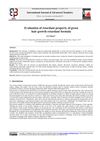5 citations,
March 2022 in “Frontiers in Medicine” PRP is effective for treating hair loss, especially with other treatments.
 April 2012 in “Lab Animal”
April 2012 in “Lab Animal” Early exposure to germs may protect against autoimmune diseases, lack of sex increases alcohol preference in fruit flies, a potential baldness treatment could involve blocking a specific receptor, skin memory cells help prevent re-infection, high-fat diets can affect brain cells related to weight, and the link between social status, stress, and heart disease in primates is unclear.
 165 citations,
September 2003 in “Toxicology and applied pharmacology”
165 citations,
September 2003 in “Toxicology and applied pharmacology” Blocking COX, especially COX-2, in the skin can reduce inflammation and pain and may help prevent skin cancer.
61 citations,
October 2011 in “Experimental dermatology” Scalp itching is common and hard to diagnose due to the complex nerve structure of the scalp.
 156 citations,
December 2012 in “Cell Stem Cell”
156 citations,
December 2012 in “Cell Stem Cell” TGF-β is crucial for controlling stem cell behavior and changes in its signaling can lead to diseases like cancer.
 5 citations,
February 2017 in “Biomolecules & Therapeutics”
5 citations,
February 2017 in “Biomolecules & Therapeutics” 4-O-Methylhonokiol helps protect skin cells from growth-stopping effects of a protein by regulating growth-related pathways.
 June 2024 in “Computational and Structural Biotechnology Journal”
June 2024 in “Computational and Structural Biotechnology Journal” Multi-omics techniques help understand the molecular causes of androgenetic alopecia.
 23 citations,
January 2021 in “Biomedicine & Pharmacotherapy”
23 citations,
January 2021 in “Biomedicine & Pharmacotherapy” DHT stops hair regrowth in mice, similar to human hair loss.
 52 citations,
September 2018 in “International Journal of Molecular Sciences”
52 citations,
September 2018 in “International Journal of Molecular Sciences” Ginseng and its compounds may help hair growth and prevent hair loss, but more human trials are needed to confirm this.
 39 citations,
December 2013 in “Phytotherapy Research”
39 citations,
December 2013 in “Phytotherapy Research” Safflower (Carthamus tinctorius) extract helps hair grow and could be used in hair products.
 25 citations,
September 2018 in “Scientific Reports”
25 citations,
September 2018 in “Scientific Reports” Morroniside may help hair grow and stay in its growth phase by affecting certain cell signals.
 December 2023 in “Journal of materials chemistry. B”
December 2023 in “Journal of materials chemistry. B” A new nanoemulsion increases oxygen for hair cells, leading to better hair growth.
 194 citations,
March 2003 in “American Journal of Pathology”
194 citations,
March 2003 in “American Journal of Pathology” Stress stops hair growth in mice by causing early hair growth phase end and harmful inflammation through a specific nerve-related pathway.
 87 citations,
March 2005 in “Journal of Dermatological Science”
87 citations,
March 2005 in “Journal of Dermatological Science” Asiasari radix extract promotes hair growth and increases protein synthesis and cell proliferation.
 42 citations,
March 2018 in “PLOS Biology”
42 citations,
March 2018 in “PLOS Biology” Autophagy is important for human hair growth and health.
 31 citations,
February 2014 in “Journal of dermatological science”
31 citations,
February 2014 in “Journal of dermatological science” Placental growth factor may help treat hair loss.
 26 citations,
October 2016 in “Biomolecules & Therapeutics”
26 citations,
October 2016 in “Biomolecules & Therapeutics” 3-Deoxysappanchalcone helps human hair cells grow and stimulates hair growth in mice by affecting certain cell signaling pathways.
 8 citations,
January 2016 in “Evidence-based Complementary and Alternative Medicine”
8 citations,
January 2016 in “Evidence-based Complementary and Alternative Medicine” Rumex japonicus extract may promote hair growth more effectively than Minoxidil.
 5 citations,
September 2020 in “Molecules”
5 citations,
September 2020 in “Molecules” Extracts from three Polynesian plants were found to promote hair growth by affecting cell growth and gene expression related to hair.
 4 citations,
June 2016 in “Journal of Pharmacopuncture”
4 citations,
June 2016 in “Journal of Pharmacopuncture” Cornu cervi pantotrichum pharmacopuncture solution helps mice grow hair by increasing hair follicle cell growth and a growth factor important for hair development.
 May 2019 in “International journal of advanced chemistry”
May 2019 in “International journal of advanced chemistry” The green cream safely slowed hair growth by 25%.
 108 citations,
July 2004 in “American Journal of Pathology”
108 citations,
July 2004 in “American Journal of Pathology” Stress increases a factor in mice that leads to hair loss, and blocking this factor may prevent it.
 54 citations,
January 2013 in “BMC Complementary and Alternative Medicine”
54 citations,
January 2013 in “BMC Complementary and Alternative Medicine” Thuja orientalis hot water extract may help hair grow by starting the growth phase and improving hair follicle development.
 45 citations,
September 2012 in “Life Sciences”
45 citations,
September 2012 in “Life Sciences” Aconiti Ciliare Tuber extract may help hair grow by activating a specific cell signaling pathway.
 30 citations,
September 2004 in “Experimental Dermatology”
30 citations,
September 2004 in “Experimental Dermatology” Scalp hair follicle culture has limits for testing minoxidil's hair growth effects.
 19 citations,
February 2018 in “Lasers in Medical Science”
19 citations,
February 2018 in “Lasers in Medical Science” Red light and LED treatments help hair grow by activating a specific cell signaling pathway.
 12 citations,
June 2011 in “Han-guk sikpum gwahakoeji/Han'gug sigpum gwahag hoeji/Han-guk sikpum gwahak hoeji”
12 citations,
June 2011 in “Han-guk sikpum gwahakoeji/Han'gug sigpum gwahag hoeji/Han-guk sikpum gwahak hoeji” Lactobacillus plantarum-fermented plant extracts promote hair growth and thickness.
 10 citations,
May 2020 in “Dermatology Research and Practice”
10 citations,
May 2020 in “Dermatology Research and Practice” Proteoglycans are important for hair growth, and a specific treatment can help reduce hair loss.
 8 citations,
June 2019 in “Journal of Ginseng Research”
8 citations,
June 2019 in “Journal of Ginseng Research” Gintonin-enriched fraction promotes hair growth and could be a potential alopecia treatment.
 6 citations,
August 2019 in “PLOS ONE”
6 citations,
August 2019 in “PLOS ONE” Gambogic Amide helps maintain hair color and promotes hair growth.



























